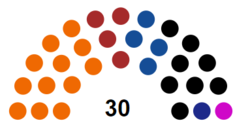Reichstag (Austrovia)
Austrovian Reichstag | |
|---|---|
| 5th Reichstag | |
| Type | |
| Type | Lower House |
Term limits | 6 months |
| History | |
| Founded | November 21st, 2017 |
| Leadership | |
Speaker | Zach Peller, National Democratic Populist Party since August 23rd 2017 (As Speaker of the California Senate) |
Deputy Speaker | Hannah Garcia, National Democratic Populist Party |
Opposition Leader | |
| Structure | |
| Seats | 30 |
 | |
Political groups | In government (20):
HM's Loyal Opposition (9):
His Majesty, The Emperor (1):
|
| Elections | |
Last election | December 2018 |
Next election | June 2019 |
| Motto | |
| Building a better tomorrow | |
| Meeting place | |
| IMessage | |
Sorry, I don't recognize the parameter "image". Please refer to the template documentation for more information.
The Reichstag ("Parliament" when translated) is the legislative body of the Austrovian Empire. It's purpose, defined by the Austrovian Constitution of 2017, is to create laws, in which all citizens are expected to follow.
The Reichstag was created to replace the Congress of Austrovia after the successful "Governmental Reform Referendum" was passed. It has 30 members, which all are elected by the people of their respective states. The Reichstag officially became the only legislative body on November 21. Currently, 5 parties have seats in the Reichstag, with the Emperor being considered a non-partisan.
Purpose
As stated before, the Reichstag is the legislative body of the Empire and creates new laws that citizens follow. Before, the Congress acted as both the Legislative and Judicial branches of the Austrovia, giving it almost complete control over the government. Once the Austrovian Constitution of 2017 was ratified by Congress, it dictated that the Reichstag will only act as the legislative branch of government, while a new branch will be created for judicial purposes.
Parties
The current parties that have seats in the Reichstag are:
| Party | Leader | Founded | Position | Seats | ||
|---|---|---|---|---|---|---|
| National Democratic Populist Party | NDPP | Daisy Drake | April 20, 2018 | Liberal Conservatism | 4 / 30
| |
| Citizen's Party | CP | Jayden Hyde | March 26, 2018 | Social Liberalism | 12 / 30
| |
| National Party | NP | Connor Pittman | February 5, 2018 | Social Conservatism | 1 / 30
| |
| Traditionalist Party | TP | Seterah Speed | October 25, 2017 | Traditionalism | 4 / 30
| |
| Phoenix Movement | P | Christopher Easton | September 20, 2018 | Right-wing Populism | 9 / 30
| |
Election Process
The Reichstag previously had elections every 2 months, with some elections happen the same day as Federal Elections. After the passing of the 2nd Electoral Reform Act, Reichstag Elections will be held every six months (along with Reich Chancellor Elections) starting June 2018. Reichstag Members are elected by citizens of their state.
Laws passed
The following is a list of the laws passed by the Reichstag:
2017
- Reichstag Creation Act (11/19/17), 17-0
- NEW Law Enforcement Protection Act (11/19/17), 10-7
- Special Forces Act (11/20/17), 11-6
- Reich Security Bureau Act (11/25/17), 11-6
2018
- Pretoria Act (1/2/2018), 10-3-7
- State Act (1/5/2018), 11-2-7
- State Government Act (1/10/18), 20-0-0
- State Monarch Appointment Act (1/19/18), 12-0-8
- Reich Chancellor Powers Act (2/14/18), 10-5-5
- Political Engagement Act (3/17/18), 9-16-5
- Electoral Reform #2 (4/20/18), 7-0-3
- Reichstag Inactivity Act (5/31/18), 5-4-0
- Imperial Includement Act (6/6/18; not signed into law until 6/8/18), 7-0-2
- Reformed Political Engagement Act (6/23/18), 7-0-4
2019
- Court Reform Act (1/19/2019), 2-5-6
- Electoral Commission Appointment Act (4/28/19), 5-5-6
- Executive Power Act (4/28/19), 5-4-7